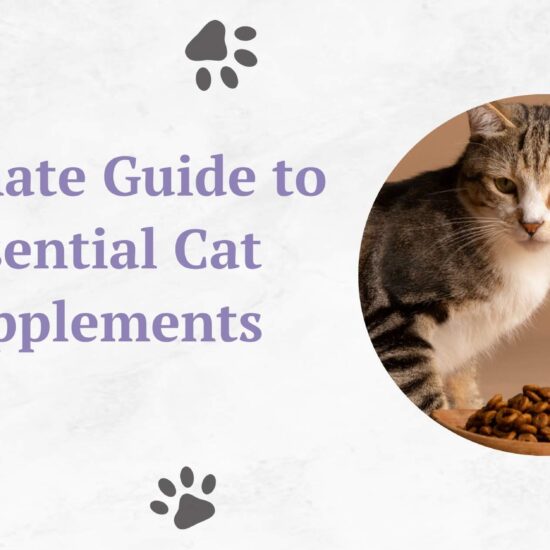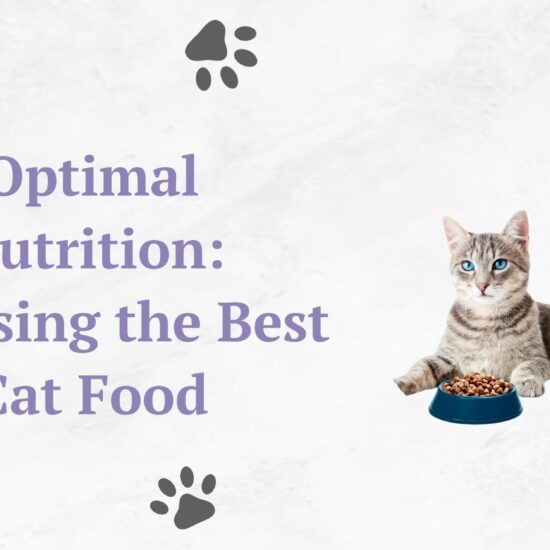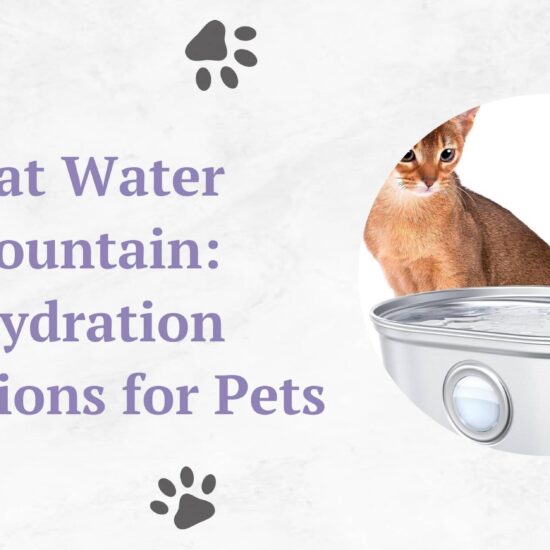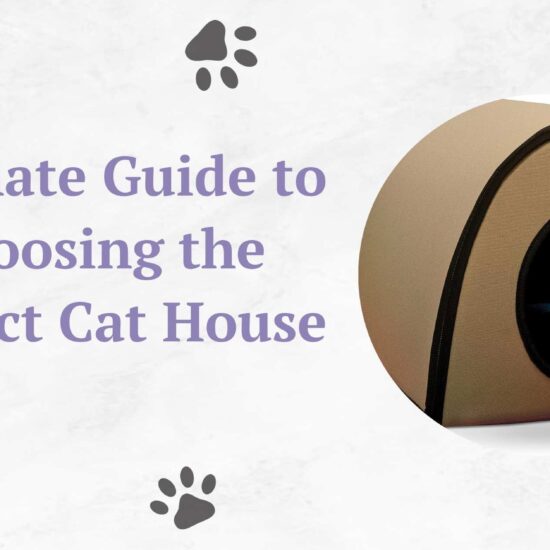We love our pets’ unconditional affection and friendship. The importance of dental health for pets is something that most caregivers tend to overlook. Just like it is for people, dental health for pets is vital to our pets’ well-being. Oral hygiene neglect can cause health problems, suffering, and poor quality of life.
Table of Contents
Here we will discuss the best ways to keep pet teeth healthy, typical dental issues, prevention, and care to ensure our pets’ bright smiles and healthy lives.
Pet Dental Health
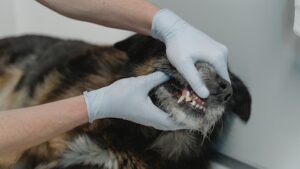
Dental Anatomy
To understand the importance of dental health for pets, we must understand their oral anatomy. Dogs and cats have different dental structures for diet and health.
Dogs
Dogs have 42 teeth—incisors, canines, premolars, and molars. Canines tear and grasp, whereas incisors nibble and groom. Flat-topped molars and premolars grind and crush food. Dogs eat both meat and plants, which affects their dentition.
Cats
For their carnivorous diet, cats have 30 teeth. incisors, canines, and molars. Carnassial teeth, long, sharp premolars, shred meat efficiently in cats. These teeth help them hunt and eat.
Pet Dental Health in Relation with General Health
Pet dental health is something that affects their general health and oral health. Plaque and tartar on teeth can cause gingivitis and periodontal diseases.
Bacteria from plaque and tartar can enter the circulation and spread throughout the body. This can cause heart, liver, and kidney bacterial infections. Bacterial endocarditis, which colonizes heart valves, can even cause heart failure. This is the importance of dental health for pets.
Apart from serious consequences, dental care for pets is necessary in general as untreated dental issues can cause pets pain, discomfort, and difficulty eating. Weight loss, malnutrition, and overall well-being may follow. Dental problems in pets can also cause irritability, hostility, or unwillingness to be handled.
Regular dental checkups and home dental care are crucial due to the oral-systemic relationship. Owners may keep their pets healthy and happy by addressing dental problems in pets early and practicing good dental hygiene.
Common Dental Problems in Pets

Dental Plaque and Tartar
Food particles, saliva, and bacteria from dental plaque can cause a sticky, white film. Plaque can develop into tartar (calculus) in days without frequent brushing and dental care. Tartar, a hard, yellowish-brown film that sticks to teeth, encourages bacteria growth.
Plaque and tartar can cause gingivitis. Gingivitis causes red, puffy, bleeding gums. Gingivitis can lead to periodontal disease, which destroys the gums, ligaments, and bones that support the teeth and may even result in tooth loss. That is why, dental health for pets cannot be ignored.
Removing Plaque and Tartar
Pet dental health requires preventing plaque and tartar. Plaque is best removed by brushing using pet-specific toothbrushes and toothpaste. Pet toothpaste is crucial for dental care for pets since human toothpaste contains hazardous chemicals.
Dental snacks or chews can recover pet dental health as they can reduce plaque and tartar. These sweets induce chewing, which mechanically cleans teeth. To avoid obesity and other health risks, use high-quality, vet-approved dental treats.
Veterinarians must use anesthetic to remove tartar and plaque from hard-to-reach places below the gumline. Scaling and polishing eliminate tartar and make plaque adhesion harder ensuring overall dental care for pets.
Periodontitis
Periodontal disease gradually destroys tooth structures. Gingivitis, inflamed gums, can progress to periodontitis, where supporting tissues and bone are damaged.
Periodontal disease pulls gum tissue away from teeth, creating pockets that hold more germs. These bacteria can harm tooth tissues and bone, loosening or losing teeth. Destroying supporting structures can hurt dental health for pets and lead to tooth extraction.
Avoiding Periodontitis
Home dental care for pets and professional dental checkups prevent periodontal disease. Regular teeth brushing, dental chews, and dental treats decrease plaque and tartar buildup, preventing gingivitis from becoming periodontal disease.
Pet owners should know that dental care for pets also includes watching for oral health issues like foul breath, swollen or bleeding gums, difficulty swallowing, or pawing at the mouth. If any of these indicators are present, a veterinarian’s dental evaluation and treatment are needed immediately.
Periodontal disease requires skilled dental cleanings. Veterinarians can diagnose the condition and treat it with thorough pocket cleaning, antibiotics, or extractions if required.
Dental Abscesses
Bacterial infections cause localized pus pockets called dental abscesses. These abscesses can cause facial or jaw enlargement, trouble eating, drooling, and pain in pets.
Untreated oral infections can spread to other parts of the body, causing major systemic disorders. So, dental health for pets is something to highly prioritize. Trauma, broken teeth, and foreign objects between teeth can also cause infections.
Avoiding Dental Abscesses
Proactive dental care for pets and early injury treatment prevent dental abscesses and infections. Regular brushing and dental chews or treats can prevent plaque and tartar buildup and bacterial illnesses.
Broken or shattered teeth require immediate veterinarian care. Dental surgery to repair or remove the tooth and antibiotics may be required.
Recognizing Dental Problems in Pets
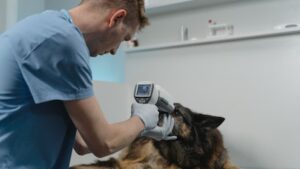
Pet owners must observe and prioritize dental health for pets because pets cannot speak. Being cautious and observant helps prevent more issues and discomfort for our pets.
Signs Of Dental Problems in Pets Include
- Bad breath (halitosis) can indicate dental problems in pets such as plaque and tartar buildup or infection.
- Swollen, red, or bleeding gums may suggest gingivitis or periodontal disease. Dental issues might make pets reluctant to eat, chew on one side, or drop food.
- Pawing at the Mouth: Frequent pawing at the mouth or face may indicate dental pain.
- Excessive drooling may indicate oral pain or swallowing issues.
- Discolored Teeth: Dental plaque can cause discolored teeth.
- Loose or missing teeth may indicate severe dental disease.
Regular Checkups
Veterinarian checkups are essential for the dental health of pets. Veterinarians can examine the pet’s mouth and discover any dental concerns during these checkups.
Veterinarians clean teeth, even below the gum line, where bacterial illnesses typically start. Scaling and polishing the teeth reduces plaque buildup and avoids overall dental problems in pets. Veterinarians can also advise on home dental care and offer goods and methods for each pet’s needs during routine dental checkups.
Preventing Dental Problems in Pets
Home Dental Health for Pets
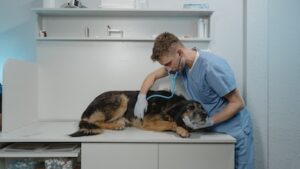
Pet dental health requires home dental care. Plaque and tartar are best prevented by brushing the pet’s teeth regularly. Use a pet-specific toothbrush and toothpaste to brush a pet’s teeth. Fluoride in human toothpaste can harm pets. Pets prefer chicken, beef, or malt-flavored toothpaste. Brushing should be introduced slowly to minimize bad associations.
Effective pet tooth brushing requires the following steps:
- Familiarization: Let the pet smell and taste the toothpaste. Let the pet suck the toothpaste off the toothbrush to introduce it.
- Gentle Start: After the pet is acquainted with the toothbrush, gently brush the outer surfaces of the teeth in circles. Plaque accumulates at the gum line.
- Positive Reinforcement: Praise and reward the pet after each successful brushing session.
- Consistency: For optimal dental care, clean the pet’s teeth at least three to four times a week, ideally daily.
Diet Impacting Dental Health for Pets
Diet affects pet dental health. Preventive measures include dental-healthy meals.
- Dental treats and chews can improve pet dental health. Dental snacks with distinct textures help pets clean their teeth while chewing. Some chews minimize plaque and tartar.
- Dry Food Over Wet: Dental health may be better with dry pet food than wet. Dry kibble cleans teeth mechanically, while moist food sticks to teeth and may cause plaque.
- Water Additives: Some pet owners use additives to decrease plaque and tartar. Before adding anything to a pet’s water, ask a vet.
Professional Dental Cleaning

Pet dental health requires regular veterinary dental cleanings. Professional cleanings remove stubborn tartar, especially below the gum line, where bacteria grow.
Based on the pet’s needs, veterinarians prescribe dental cleaning frequency. Some pets need yearly cleanings, but some, especially those with dental concerns, need more.
A general anesthetic is used to keep pets safe and comfortable during professional dental cleanings. Veterinarians can clean teeth, inspect the oral cavity, and handle dental concerns quickly. Pet owners can prevent dental issues and maintain pet dental health by combining home dental care with professional cleanings.
Note: There might be affiliate links mentioned here. We may receive a commission if you purchase a product through an affiliate link. There is no additional charge for you. Please do your own research before making any online purchases.
Specific Dental Care for Pets
Dog Dentistry
Dog dental care depends on breed, size, and dental needs. Due to overpopulation, smaller dogs may have dental concerns, whereas larger breeds may have tooth fractures or wear.
Dog owners can follow these dental care tips:
- Use dog-specific toothbrushes and toothpaste: Dogs like flavored toothpaste and toothbrushes that fit their mouths.
- Regular Checkups: Visit a veterinarian for regular dental checkups to detect and treat problems.
- Chew Toys: Provide dental-healthy chew toys to discourage harmful chewing. This makes these dental-friendly chew toys the best way to keep pet teeth healthy.
- Raw Bones (Supervised): Some pet owners use raw bones to clean their dog’s teeth naturally. To avoid choking or tooth fractures, choose bones appropriate for the dog’s size and supervise chewing.
Cat Dentistry
Dental care for cats is harder. Most cats dislike teeth cleaning, making additional dental care measures necessary.
Follow these cat dental care instructions:
- Dental Wipes or Pads: Cats that hate brushing can use these. These products eliminate cat plaque.
- Dental sweets and Toys: Encourage chewing and cleaning using dental sweets and toys.
- Diet: Avoid wet food and choose cat meals that improve dental health.
- Regular Veterinary Exams: Early dental disease detection requires regular veterinary exams, including dental exams.
Dental Health for Pets at an Older Age
Dental needs change as pets age. Due to normal tooth wear, senior pets may have greater dental difficulties. Arthritis or other health issues may also affect oral hygiene.
Senior pet owners should change dental care:
- Soft or wet food may help senior pets with dental difficulties or missing teeth chew.
- Regular Checkups: Increase dental checkups to detect and treat dental issues quickly.
- Dental supplements: Some senior pets may benefit from oral health-promoting dental supplements.
- Pain Management: Consult a vet for senior pet dental pain management.
Dental Emergencies

Accidents, injuries, and sudden dental difficulties can cause dental emergencies. Pet owners must plan and respond quickly and efficiently.
In case of dental emergencies keep the following points in mind:
- Stay Calm: Staying calm helps calm the pet and lets you assess the issue.
- Contact the Veterinarian: Call the vet for advice and an emergency visit.
- Bleeding: Gently push with clean gauze or a cloth to stop bleeding.
- Don’t Wait: Dental emergencies can be painful and dangerous for pets, so don’t postpone treatment.
FAQs
Why is dental care for pets important?
Pets’ oral and overall health depend on dental health. Plaque, tartar, gingivitis, and periodontal disease can cause pain, discomfort, and trouble eating if neglected. Untreated dental problems in pets can also cause heart, liver, and kidney infections.
How can I prevent dental problems in pets?
Home dental care and expert dental checkups can dental problems in pets. Plaque and tartar are best prevented by brushing your pet’s teeth with pet-specific toothbrushes and toothpaste. Dental snacks or chews can also reduce plaque. Veterinarian dental cleanings can also remove stubborn tartar and manage growing tooth concerns.
How often should I brush my pet’s teeth?
Ideally, brush your pet’s teeth regularly. If not, try three to four times a week. Brushing daily prevents plaque and tartar formation.
Can dental problems in pets cause other health issues?
Dental problems in pets can cause other health difficulties. Oral germs can enter the circulation and damage the heart, liver, and kidneys if left untreated.
My cat hates toothbrushing. How can I help their teeth?
If your cat won’t brush, use dental wipes or pads to remove plaque. Cats may clean their teeth by chewing dental treats or toys. Giving them dental treats and toys is the best way to keep pet teeth healthy.
Can I detect if my pet has tooth pain?
Dental pain can cause foul breath, swollen or bleeding gums, difficulty eating, pawing at the mouth, and excessive drooling in pets. If you see any of these indicators, see a vet immediately.
How often should my pet undergo professional dental cleanings?
Professional dental cleaning frequency depends on your pet’s demands. Most pets need annual dental cleanings, but those with dental concerns may need more.
Can dental sweets and chews replace brushing?
Dental treats and chews can reduce plaque and tartar, but they should not replace brushing. Plaque removal and dental health are best achieved by brushing your pet’s teeth.
Are pets professional dental cleanings anesthetic?
Professional pet dental cleanings require an anesthetic. Veterinarians can examine, clean, and treat dental abnormalities below the gumline while the pet is under anesthesia.
How do I handle a pet dental emergency?
In a dental emergency, stay cool and call your vet for advice and an emergency visit. To stop bleeding, gently push with clean gauze or a cloth. Dental emergencies are uncomfortable and dangerous for pets, so seek professional assistance immediately.
Conclusion
Responsible pet ownership includes understanding the importance of dental health for pets. In this article, we discussed the best ways to keep pet teeth healthy. Pet owners can protect their pets’ dental health and well-being with preventive measures like frequent home dental care, dental treats and chews, and professional dental cleanings.
Maintaining a pet’s oral health throughout their life requires tailoring dental treatment to their specific needs, whether they’re a dog, cat, elderly, or having a dental emergency. Pet owners can deepen their bonds with their pets by preventing dental problems in pets and swiftly resolving overall health concerns.





